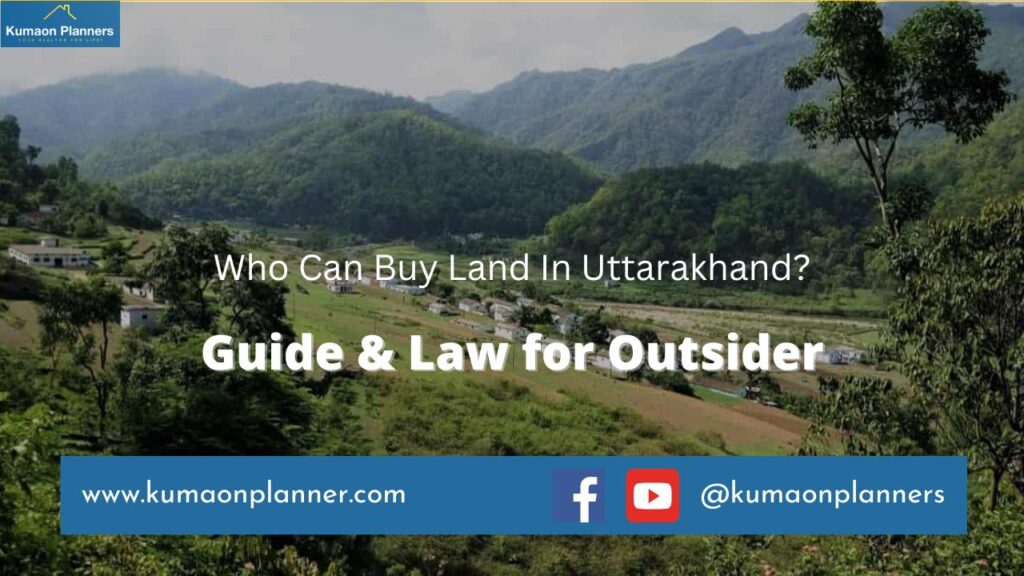Update: On February 19, 2025, the Uttarakhand Cabinet approved a stringent land law aimed at protecting the state’s natural resources and cultural identity. This decision responds to longstanding public demands for stricter regulations on land purchases by non-residents. Under the new law, individuals from outside Uttarakhand are prohibited from purchasing agricultural and horticultural land in 11 districts, excluding Haridwar and Udham Singh Nagar. Additionally, the law revokes provisions from 2018 that had relaxed land purchase rules, centralizes transaction approvals through a government portal, and mandates regular reporting by district magistrates to ensure compliance. Chief Minister Pushkar Singh Dhami emphasized that this historic step will safeguard the state’s resources, cultural heritage, and citizens’ rights, while preserving its original identity.
Old Land Law (Post-2018 Amendments)
Before the recent changes, the 2018 amendments had relaxed land purchase rules, allowing outsiders to buy land more freely.
Pros:
- Boosted Investment – Encouraged real estate and tourism investments in Uttarakhand.
- Increased Land Prices – Higher demand for land led to increased land value, benefiting local landowners.
- More Economic Activities – Facilitated commercial development, boosting local businesses.
- Easier Land Transactions – Less bureaucratic hurdles made transactions quicker and more flexible.
Cons:
- Uncontrolled Land Acquisition – Large-scale purchases by outsiders led to land hoarding.
- Loss of Agricultural Land – Many farmlands were converted into resorts, commercial projects, and non-agricultural uses.
- Local Displacement – Rising land prices made it difficult for locals to buy land, forcing migration.
- Environmental Concerns – Unplanned development led to ecological damage, deforestation, and increased landslides.
- Cultural Impact – Rapid urbanization diluted local traditions and culture.
New Land Law (2025)
The new law introduces stricter regulations, particularly restricting non-residents from buying agricultural and horticultural land in 11 hill districts.
Pros:
- Preserves Local Land Rights – Protects agricultural land for local farmers and residents.
- Prevents Land Hoarding – Stops large corporations and wealthy outsiders from accumulating land.
- Environmental Protection – Controls deforestation and unplanned real estate expansion in eco-sensitive areas.
- Cultural Conservation – Ensures that local traditions and heritage remain intact.
- Fair Land Pricing – Prevents property speculation, keeping land affordable for locals.
Cons:
- Reduced Investment – Could deter potential investors, impacting the real estate and tourism sectors.
- Slower Economic Growth – With limited external funding, development projects may slow down.
- Landowners May Lose Profits – Locals looking to sell land might find fewer buyers, affecting land price appreciation.
- More Bureaucracy – Centralized approval processes might increase red tape, delaying transactions.
Final Verdict:
- The old law benefited investors and commercial growth but led to land misuse, environmental damage, and affordability issues for locals.
- The new law prioritizes land conservation and local interests but may slow down economic growth and investment.
Would you like a more detailed analysis on how this affects real estate buyers or property investments in Uttarakhand? Comment Below!
Land Law for Outsiders
Uttarakhand, with its breathtaking mountain ranges and serene valleys, is a land of immense natural beauty and cultural heritage. However, navigating the legalities of land ownership in the state can be a complex affair. The Uttarakhand Bhu Kanoon (Land Law) plays a central role in regulating land transactions and protecting the interests of local residents. This guide aims to demystify the Bho Kanoon, providing a clear explanation of its purpose, key provisions, and recent updates, empowering you to make informed decisions regarding land ownership in Uttarakhand.

You might have heard about the Bhu Kanoon in Uttarakhand but what exactly it is and how you can buy land in Uttarakhand while following all the rules?
What is the Uttarakhand Bhu Kanoon?
Bhoo Kanun is the land law of Uttarakhand. It is a complex and controversial issue, with many different stakeholders involved. The main goal of the Bhoo Kanun is to protect the interests of the local people, while also encouraging investment and development in the state.
Enacted in 2016, the Bho Kanoon serves as a legal framework for managing land ownership and transactions in the state. Its core objectives encompass:
- Prioritizing local residents: The law prioritizes Uttarakhand natives in land ownership matters, aiming to safeguard their rights and prevent uncontrolled land acquisition by outsiders.
- Curbing land grabbing: The legislation strives to combat land grabbing practices, ensuring fair and transparent land deals for all stakeholders.
- Preserving agricultural land: Recognizing the significance of agriculture for the state’s economy and environment, the Bho Kanoon seeks to protect and preserve agricultural land by restricting its conversion for non-agricultural purposes.
In 2002, a regulation was instituted restricting individuals from other states to purchase land in Uttarakhand, limiting it to parcels of up to 500 square meters. However, in 2007, this threshold was reduced to 250 square meters.
The Bhoo Kanun has been criticized by some for being too restrictive. They argue that it prevents investment and development in the state and that it discriminates against non-residents. Others argue that the Bhoo Kanun is necessary to protect the interests of the local people, who are already facing a shortage of land.
Key Provisions of the Bhu Kanoon
The Bhoo Kanun is a complex and controversial issue. There are strong arguments on both sides of the debate. Ultimately, the decision of whether or not to reform the Bhoo Kanun is a political one.
The following are some of the key provisions of the Bhoo Kanoon:
- Restrictions on land sale to non-natives: Non-Uttarakhand residents are generally prohibited from purchasing agricultural land or acquiring residential land exceeding 250 square meters. Exceptions exist for specific categories like educational institutions and government projects, subject to approval.
- Regulated Land Use: The law categorizes land into distinct zones, such as agricultural, residential, and commercial. Conversion of land from one zone to another necessitates obtaining specific permissions to ensure responsible development.
- Emphasis on Registration and Transparency: The Bho Kanoon emphasizes the importance of transparency and registration in all land transactions. Proper documentation and registration with the concerned authorities are mandatory for all land dealings.
- Non-residents are prohibited from purchasing land in Uttarakhand, with some exceptions.
- Non-residents can purchase land if they have been living in Uttarakhand for at least 15 years.
- Non-residents can purchase land up to a maximum area of 250 square meters.
- Non-residents must obtain government permission before purchasing land in Uttarakhand.
The future of the Bhoo Kanun is uncertain. The Uttarakhand government is still considering the recommendations of the Uttarakhand Bhoo Kanoon committee. The law may be reformed, or remain unchanged.
Recent Developments:
As of March 2024, the Bho Kanoon remains in effect. In December 2023, the Uttarakhand government established a high-level committee to review and recommend potential amendments to the law. This committee’s focus lies on striking a balance between safeguarding the interests of local residents and fostering sustainable development in the state.
Data Snapshot:
- Land area of Uttarakhand: 53,483 sq. km (source: Government of India website)
- Percentage of agricultural land: Approximately 62% (source: Department of Agriculture & Farmers’ Welfare, Uttarakhand)
- Number of registered land transactions (2022): Over 100,000 (source: Uttarakhand Registration Department)
Disclaimer: This blog post serves as a general overview of the Bho Kanoon and does not constitute legal advice. For specific situations or inquiries, consulting a qualified legal professional is highly recommended.
Do you have any questions or require further clarification regarding the Uttarakhand Bhu Kanoon? Share them in the comments section below, and let’s engage in a conversation about responsible land ownership and development practices in Uttarakhand.
You might like to read our previously published blog post about Uttarakhand real estate.



